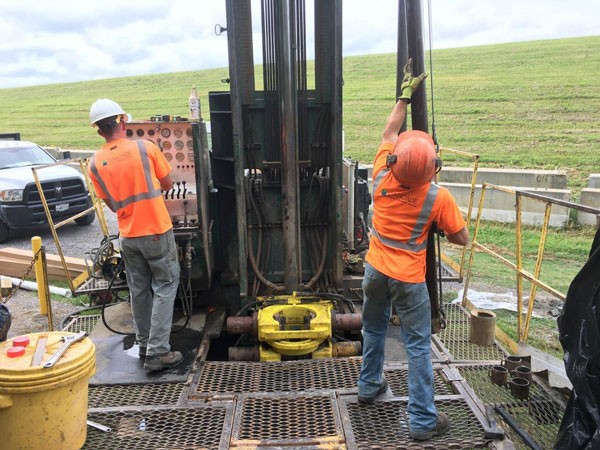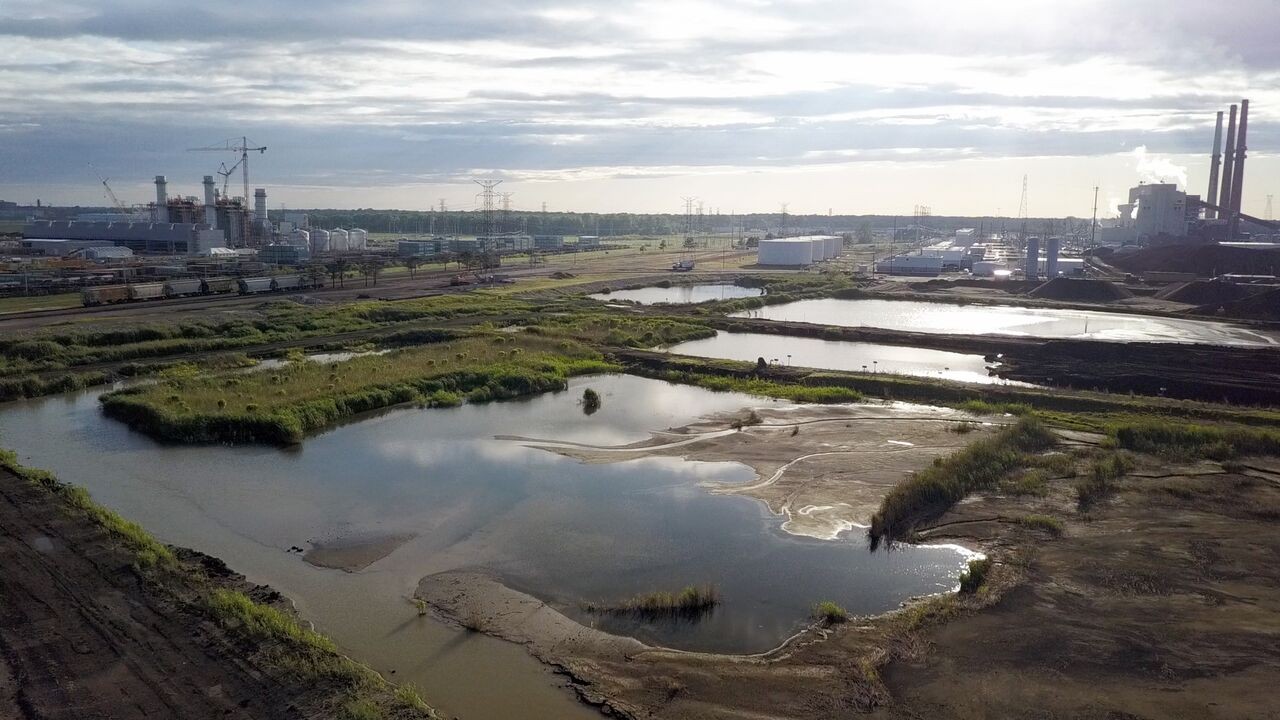 Tennessee Valley Authority
Tennessee Valley Authority
TVA workers install water quality monitoring wells near the Allen Fossil Plant.
The Tennessee Valley Authority (TVA) announced Friday it will remove the arsenic found in groundwater near its now-shuttered Allen Fossil Plant, and begin forming a plan for the future of the coal ash there that caused the contamination.
Last year, investigators found 300 times the legal limit of arsenic in an alluvial aquifer that sits above the Memphis Sand Aquifer, the source of Memphis’ famously pure drinking water. It is from that shallower, alluvial aquifer above the Memphis Sand that the TVA will pump water and treat it to remove the arsenic.

State officials mandated an investigation of the site and found that contaminated aquifer and the Memphis Sand aquifer were connected, posing a possible threat to the city’s drinking water.
“TVA intends to remove the arsenic by pumping out the water in the alluvial aquifer and capturing the contaminants,” TVA officials said Friday in a blog post called, “What’s Going on at the Allen Fossil Plant?”
“If you pass by the fossil plant site in December, you might see workers setting up equipment to prepare for this process,” the post stated.
Scott Banbury, Conservation Programs Coordinator for the Tennessee Chapter of the Sierra Club, “We love that they are doing that, but it’s not a singular solution.”
[pullquote-1] “We appreciate they are taking their arsenic back, but as long as the ash is there, it’s an ongoing problem,” Banbury said.
TVA is now taking public comments on a plan, called an Environmental Impact Statement (EIS), “to consider the potential environmental effects of various options for closure” for two coal ash storage sites at the Allen plant.

A coal ash pond at TVA’s Allen Fossil Plant.
One site was closed in 2016 and contains an estimated 250,000 cubic yards of coal ash. TVA will consider opening the site and removing the ash. The other, the site of the arsenic contamination, contains an estimated 2.7 million cubic yards of coal ash. TVA said it will consider all options — from removing the coal ash to sealing the ash in place and closing the storage site.
Public comments on the plan are open until January 4th, 2019. Banbury said the deadline does not give near enough time for citizens to look at the material and weigh the options or possible problems. He said his group will be requesting an extension on the deadline and will push for a public hearing on the matter in Memphis.
You can submit your comments on the scope of the draft EIS here. Comments can also be submitted online at www.tva.com/nepa, emailed to arfarless@tva.gov, or mailed to Ashley Farless, NEPA Compliance Specialist, Tennessee Valley Authority, 1101 Market Street, BR4A-C, Chattanooga, TN 37402.
To be considered, comments must be received no later than Jan. 4, 2019. Please note that any comments received, including names and addresses, will become part of the project administrative record and will be available for public inspection.
TVA said crews will also be installing new wells around the Allen site to monitor water quality. The wells are part of an Environmental Investigation Plan (EIP) ordered by the Tennessee Department of Environment and Conservation (TDEC) in 2015. The plan covers seven TVA sites with coal ash storage on-site.
The EIP is to “determine the environmental impacts of the (coal ash), including impacts to surface water, ground water, and soil,” reads the TVA blog. The plan is not directly related to the TVA’s aforementioned plan to remove the arsenic from the water at the Allen site.
 Tennessee Valley Authority
Tennessee Valley Authority
The depth and amount of the contamination, according to the TVA investigation.
But environmental groups say TVA’s Environmental Impact Plan leaves out important data that has already been collected from earlier investigations. The first, remedial investigation, found contaminants at the site, and a later review by the University of Memphis and the United State Geological Survey found that the two aquifers were linked.
Protect Our Aquifer, The Tennessee Chapter of the Sierra Club, and the Southern Environmental Law Center filed a joint comment on the matter to the TVA earlier this week.
“[Data from the investigations] indicated that there is a current risk of ongoing coal ash contamination in the Memphis Sand Aquifer and McKellar Lake due to TVA storage of coal ash in the leaking, unlined East Ash Pond and the consequent coal ash contamination of the alluvial aquifer,” reads the comment. “Neither the (remedial investigation) itself nor the EIP acknowledge this current and ongoing risk, and therefore, do not outline an appropriate next step in the ongoing investigation of coal ash contamination at the Allen Plant site.”
Further, the groups said the timeline to start cleaning up the site is “unacceptable.” The TDEC Commissioner ordered TVA to form a plan to clean up coal ash storage sites in 2015, they said. If the process moves along as prescribed, “it will have taken five years since the issuance of the order to even begin a discussion about appropriate corrective actions to address pollution we already know has occurred and is occurring at the site.”